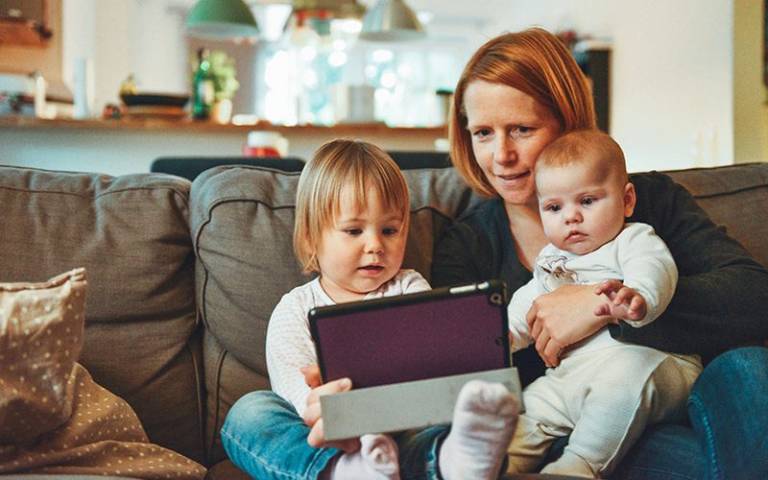IOE app approved to help families kick start learning at home
21 February 2020
A learning game co-designed by UCL Institute of Education (IOE) is one of six apps approved by a Department for Education-appointed panel of experts.

The game, Navigo, was developed by IOE academics on the iRead project with digital designers Fish in a bottle. iRead is a 4-year project based at the IOE’s UCL Knowledge Lab that aims to develop personalised learning technologies to support reading skills.
Navigo aims to support beginner readers to develop reading skills including accuracy, fluency and comprehension through engaging with the personalised content and game activities. It is designed for ages 5+.
Following a competition to find the best educational apps for parents to engage young children in learning at home, Navigo and the other five apps were approved by the DfE panel. They all focus on early literacy, language and communication.
The apps cover activities ranging from interactive story books, handwriting exercises using Artificial Intelligence, and educational video games.
The technology announcement comes as new data reveals three quarters of children aged five and under have used smartphone or tablet apps at least once in the last six months to learn.
The six apps - published on the Hungry Little Minds website – are part of the government’s drive to help parents make informed decisions about the use of technology in creating positive learning environments at home.
Dr Emma Sumner, co-investigator on the iRead project, said: "The Navigo Game - an app from the iRead project team - gives children the opportunity to practise skills that underpin reading. It has been designed specifically for primary-aged children, with the curriculum in mind. As they progress through the game, children will encounter a variety of activities that focus on reading accuracy, fluency or comprehension.
"While the iRead team has expertise in education and design, an important part of the development of the app was ensuring that the pupil and teacher voice was considered. We've had great feedback from children using the app in the development phase and now that we are in the evaluation phase of the project, we have close to 600 pupils in the UK currently using Navigo - and even more across Europe.
"The project team has worked extremely hard to make sure that Navigo is educationally appropriate (informed by the latest research) and motivating for the child. We are all so pleased to receive this validation from the Department for Education."
The expert panel who accredited the apps, chaired by Professor Jackie Marsh of the University of Sheffield and appointed by the Department for Education, included children’s digital media consultants, early learning charities and researchers at universities.
Education Secretary Gavin Williamson said:
“The first few years of a child’s life are crucial in equipping them with the skills needed for the classroom, and we are working with families to make it easier to weave early learning into daily activities.
“We know that the majority of families are using technology in fun and visual ways to support their child’s early education, but it can be difficult for busy parents to work out what content is best.
“This list of expert-approved apps helps them make confident decisions that benefit their child’s language and literacy skills.”
The approved apps all meet agreed criteria, including elements of play, interaction and ranging levels of difficulty. The list of accredited apps builds on the Hungry Little Minds campaign, by helping parents across England choose from hundreds of apps already available on the market.
The campaign gives parents access to video tips, advice and suggested games to help with early learning for their children from age 0 to five.
The six apps published on the Hungry Little Minds website include:
- Lingumi (For children aged 2-5): Sets of learning games, speech recognition games and video-based games to help with a child’s grammar and getting them speaking their first words early on.
- Kaligo (For children aged 3-5): The first digital handwriting exercise book using a stylus and tablet, built using AI and co-created with teachers, occupational therapists and neuroscientists.
- Phonics Hero (For school-aged children): Over 900 fun, varied and motivating games to take a child step by step through the critical 44 phonetic sounds of the English language.
- Teach Your Monster to Read (For school-aged children): Covers the first two years of learning to read, from matching letters and sounds to enjoying little books, designed in collaboration with leading academics.
- Navigo Game (For school – aged children): Focuses on developing skills that underpin reading, including phonics, letters and sounds.
- Fonetti (For school-aged children): The world’s first ‘Listening Bookshop’ interacting with children by giving visual cues in real-time as they read aloud and highlighting where the most support is needed.
Chair of the expert panel Professor Jackie Marsh, Professor of Education at University of Sheffield, said:
“The panel is delighted with the approved apps, as they all offer valuable opportunities to support children's early literacy development. Apps that are of most educational value to children contain a number of features, such as a design which makes the app easy to use and also offers guidance and support for parents, enabling the content to be adjusted for individual children. Apps should also be engaging and fun to use, with clear learning goals and the use of feedback that can be reassuring and motivating for children. All of the approved apps contain these features, and we are confident that they can have a positive impact on children's early literacy learning.”
Links
- Read about iRead on the EU Horizon 2020 website
- Hungry Little Minds Campaign
- iRead project
- UCL Knowledge Lab
- Department of Culture, Communication and Media
- Department of Psychology and Human Development
- Fish in a bottle
 Close
Close

